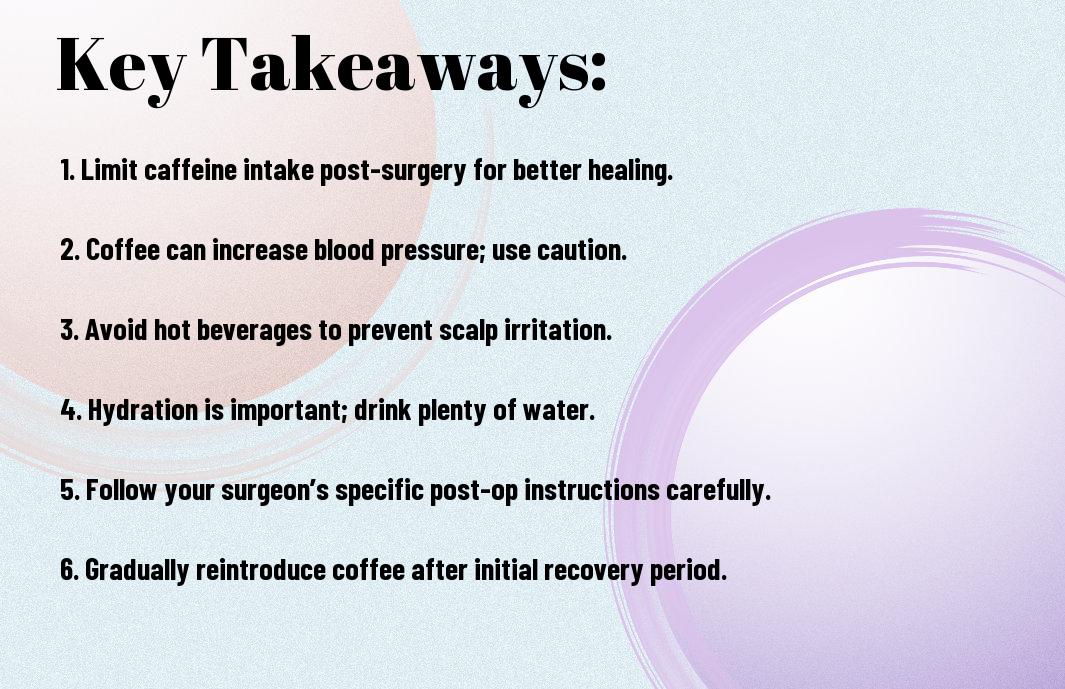Recovery is a vital phase following your hair transplant, and understanding what you can consume is necessary for optimal healing. You may have heard conflicting advice about coffee, but it’s important to note that consuming caffeine too soon can lead to increased swelling and heightened blood pressure. However, once you’ve reached a certain point in your healing, moderate consumption may be permissible. In this post, we will explore the best practices for your recovery, helping you make informed choices for your newly transplanted hair.

Key Takeaways:
- Caffeine Impact: Consuming coffee might affect blood circulation and hydration, which are important for healing after a hair transplant.
- Timing Matters: It’s generally advised to avoid coffee for at least few days post-surgery to ensure optimal recovery.
- Consult Your Surgeon: Always check with your healthcare provider for personalized advice during your recovery process.

Understanding Hair Transplantation
For anyone considering hair restoration, understanding the process of a hair transplant is imperative to manage your expectations and ensure a smooth recovery.
What is a Hair Transplant?
Around the world, many individuals seek hair transplants as a permanent solution to hair loss. This surgical procedure involves relocating hair follicles from a donor site, typically the back of your head, to areas experiencing thinning or balding. The process allows for natural hair growth in areas where it’s needed most.
Types of Hair Transplant Procedures
Transplantation techniques have evolved significantly with advancements in technology. Here’s an overview of the main types:
| Follicular Unit Transplantation (FUT) | Surgical removal of a strip of skin containing hair follicles. |
| Follicular Unit Extraction (FUE) | Extraction of individual follicular units directly from the scalp. |
| Direct Hair Implantation (DHI) | Implanting hair follicles without prior channel creation. |
| Semi-Advanced Techniques | Combining FUT and FUE for personalized care. |
| Robotic Hair Restoration | Using robotic systems for precision and minimal invasiveness. |
- FUT offers a more extensive approach but leaves a linear scar.
- FUE provides a less invasive option with no linear scars.
- DHI is known for quicker recovery times.
- Semi-Advanced techniques cater to your unique needs.
- Robotic Restoration combines technology with traditional methods.
Knowing these options empowers you to make a well-informed choice about your hair restoration journey.
The Hair Growth Cycle
Follicular health is vital to the success of your hair transplant. This cycle consists of three phases: anagen (growth phase), catagen (transition phase), and telogen (resting phase), which collectively governs how your hair evolves over time.
Consequently, understanding the hair growth cycle can aid in setting realistic expectations after your transplant. During the anagen phase, hair follicles actively grow, while in the catagen phase, the follicles shrink. Finally, in the telogen phase, hair sheds. After a hair transplant, newly transplanted follicles may temporarily enter the telogen phase before developing and thriving in their new location. Awareness of these stages ensures you’re patient and informed during your recovery.
The Importance of Post-Operative Care
Your overall success after a hair transplant heavily relies on the care you take during the recovery period. Post-operative care is important to ensure proper healing and optimal hair growth. Adhering to your surgeon’s guidelines will significantly affect how well your grafted hair integrates and flourishes in its new environment.
Initial Recovery Phase
Care for your scalp during the initial recovery phase is vital. You’ll need to keep the transplanted area clean and avoid touching or scratching it. This stage typically lasts for a few days and requires you to be gentle to prevent any damage to the newly implanted hair follicles.
Long-Term Care for Transplanted Hair
Recovery from a hair transplant involves ongoing care to ensure the longevity and health of your transplanted hair. Maintaining a routine that supports proper scalp hygiene and nutrition will help the hair grow in thicker over time.
Long-term care includes regular washing of your hair with a mild shampoo and following a nutritious diet to provide the necessary vitamins and minerals. You should also consider using products specifically designed for hair grafts, as they can help maintain the health of your hair follicles. Routine follow-ups with your surgeon can also keep track of your progress and address any concerns.
Things to Avoid After a Hair Transplant
Above all, it’s important to avoid certain activities that could jeopardize your recovery. Steer clear of vigorous exercise, swimming in pools or oceans, and direct sun exposure during the healing phase.
Hair follicles are at their most vulnerable right after the transplant. Engaging in strenuous activities can increase blood flow to your scalp, leading to potential dislodging of hair grafts. Additionally, avoiding tight hats, hair dryers, and products containing harsh chemicals will further protect your newly transplanted hair and support long-term success.
The Role of Caffeine in Recovery
Not all substances are created equal, especially when it comes to recovery after a hair transplant. Caffeine can affect your body in various ways, and understanding these aspects can help you make informed choices about your post-operative care.
Effects of Caffeine on the Body
One important aspect of caffeine is how it interacts with your central nervous system. While it can provide an energy boost, excessive consumption may lead to dehydration and increased heart rate, which can hinder your recovery process.
Caffeine Consumption and Blood Flow
An necessary consideration regarding caffeine is its impact on blood circulation. Proper blood flow is vital for healing, as it helps transport nutrients and oxygen to the transplanted areas.
Consumption of caffeine can temporarily increase heart rate and constrict blood vessels, potentially impacting blood flow to your scalp. This is significant during the initial recovery phase after your hair transplant, as optimal blood circulation is necessary for the health of newly transplanted hair follicles. You may want to limit your intake of caffeinated beverages to avoid complications in your recovery.
Caffeine and Stress
Along with affecting your body physically, caffeine can also influence your stress levels. After a procedure like a hair transplant, managing stress is vital for a smooth recovery.
With caffeine stimulating the release of stress hormones such as cortisol, it can contribute to feelings of anxiety that might be counterproductive to your recovery. Lowering your caffeine intake during this time could help you maintain a more calm and focused mindset, ultimately aiding in your overall healing process. Make sure to monitor how caffeine affects your stress levels and adjust accordingly for optimal recovery.
Can You Drink Coffee After a Hair Transplant?
Unlike many other post-operative recovery protocols, the consumption of coffee after a hair transplant is generally not prohibited. However, it is important to manage your caffeine intake carefully to ensure a smooth recovery process.
Timing of Coffee Consumption
Coffee should be avoided for at least the first 48 hours after your hair transplant. This waiting period allows your scalp to stabilize and minimizes any potential for increased swelling or blood pressure. You can gradually reintroduce coffee after this initial timeframe, but pay attention to how your body reacts.
Recommended Limits on Caffeine Intake
Consumption of caffeine should be limited to avoid increased heart rate and high blood pressure, which could impact your recovery. Experts recommend keeping your daily intake to no more than 200-300 mg, equivalent to about two to three cups of coffee.
In fact, consuming too much caffeine can lead to dehydration and increased anxiety, potentially hindering your healing process. Staying within the recommended limits ensures that your body can focus on recovery without the added stress that caffeine might introduce.
Alternatives to Coffee During Recovery
Recovery can be supported by opting for caffeine-free alternatives, such as herbal teas or decaffeinated beverages. These options can provide comfort without compromising your healing process.
Coffee alternatives not only prevent potential complications, but they also allow you to stay hydrated, which is vital for your recovery. Herbal teas can offer soothing properties, while refreshing fruit juices can keep you energized without the negative effects of caffeine. Consider varying your choices to maintain hydration and support overall wellness during your recovery journey.
Other Dietary Considerations
All aspects of your diet can play a significant role in your recovery after a hair transplant. This includes ensuring you maintain a balanced intake of nutrients necessary for healing and hair growth. However, certain foods and beverages may affect your recovery process, making it necessary to approach your diet with care.
Importance of Hydration
Above all, staying well-hydrated following your hair transplant is vital. Water helps your body recover by facilitating nutrient transport and reducing swelling. Aim to drink plenty of water throughout the day to support your healing process.
Nutrients that Promote Hair Growth
An effective recovery plan should emphasize the intake of specific nutrients known to promote hair growth. These include protein, vitamins, and minerals that nourish your hair follicles and improve blood circulation.
And while focusing on recovery, incorporate foods rich in biotin, vitamin D, and omega-3 fatty acids, as these nutrients strengthen hair and stimulate growth. Incorporating lean proteins, leafy greens, nuts, seeds, and fish into your diet can significantly aid in hair restoration. Consider consulting a nutritionist for tailored guidance on dietary choices that enhance recovery.
Alcohol and Smoking: A Cautionary Note
At this stage of your recovery, it is important to be mindful of alcohol consumption and smoking. Both can hinder your healing process and increase the risk of complications.
Vitamins can help counteract some negative effects on recovery, but they cannot fully negate the risks associated with alcohol and cigarette smoking. For optimal recovery, avoid these substances to promote better blood flow and enhance nutrient absorption, ensuring your new hair follicles have the best chance to thrive. Prioritizing your health during this time will yield the best long-term results.

Common Concerns and Misconceptions
Despite the excitement of your hair transplant, you may encounter various concerns and misconceptions during your recovery journey. Understanding these can help you navigate the process with more confidence and clarity.
Myths About Hair Transplant Recovery
About various myths surrounding hair transplant recovery often lead to unnecessary anxiety. Some believe that the transplanted hair will fall out immediately or that recovery takes an unusually long time. In reality, each individual’s healing process can vary, and most issues are temporary.
Understanding Hair Shedding Post-Transplant
For many, experiencing hair shedding following a hair transplant is alarming. This phase, known as “shock loss,” typically occurs within the first few weeks post-surgery and can create concerns about the success of the transplant.
Consequently, it’s important to understand that this shedding is a normal part of the healing process. The hair follicles are adapting to their new environment, and they usually enter a resting phase before growing back stronger. Reassurance lies in the fact that most individuals see noticeable regrowth within a few months, so try not to panic if you notice shedding.
Reassurance for Anxiety During Recovery
After your hair transplant, it’s common to feel a sense of anxiety about the outcome. Many patients face uncertainties about their appearance and the success of the procedure, which can be daunting.
Due to the emotional and physical changes you experience during recovery, it’s natural to feel a mix of excitement and apprehension. Taking the time to educate yourself about the recovery process, staying in close communication with your surgeon, and understanding that hair growth is a gradual journey can help ease your worries. Trusting the process and following your post-operative care instructions will support optimal results.
Conclusion
Conclusively, after a hair transplant, it’s wise to limit your coffee intake, especially during the initial recovery phase. Caffeine can increase blood pressure and lead to dehydration, potentially compromising your healing process. You should focus on staying hydrated and following your physician’s post-operative care instructions to ensure optimal results. Consult with your healthcare provider about when it’s safe to resume your usual coffee habits, ensuring your recovery is as smooth as possible.
FAQ
Q: Can I drink coffee immediately after my hair transplant?
A: It is generally advised to avoid coffee for at least the first few days after your hair transplant. Caffeine can increase blood flow and may lead to increased swelling, which is not ideal during the initial recovery phase. It is best to consult with your surgeon for personalized advice based on your condition.
Q: How long should I wait before drinking coffee post-surgery?
A: Most experts suggest waiting about 5 to 7 days before reintroducing coffee into your diet. This period allows for the initial healing of the grafts and reduces the risk of complications. Always check with your healthcare provider for guidance tailored to your situation.
Q: What are the potential effects of drinking coffee after a hair transplant?
A: Drinking coffee too soon after a hair transplant can lead to increased heart rate, blood pressure, and swelling around the transplanted area. These effects can hinder the healing process and delay recovery. Moderating your caffeine intake is recommended during this time.
Q: Can I have decaffeinated coffee after my hair transplant?
A: Decaffeinated coffee may be a safer option compared to regular coffee, as it contains minimal caffeine. However, it’s still best to wait a few days post-surgery. Always discuss this choice with your healthcare provider to ensure it aligns with your recovery plan.
Q: Are there any other beverages I should avoid during recovery?
A: Besides coffee, it’s a good idea to limit or avoid alcohol and sugary drinks, as these can also affect your recovery. Staying hydrated with water and herbal teas can support overall healing and is often encouraged during recovery from a hair transplant.
Q: How can caffeine affect swelling after a hair transplant?
A: Caffeine can lead to increased swelling as it may cause blood vessels to dilate, affecting the healing process. Swelling is common after a hair transplant, and minimizing caffeine intake can help manage it more effectively during the initial recovery stages.
Q: What are some tips for a healthy diet after a hair transplant?
A: A nutritious diet can support healing. Focus on consuming plenty of fruits, vegetables, lean proteins, and whole grains. Foods rich in vitamins A, C, and E, as well as omega-3 fatty acids, can promote hair growth and overall recovery. Staying hydrated is also key to a successful recovery.
